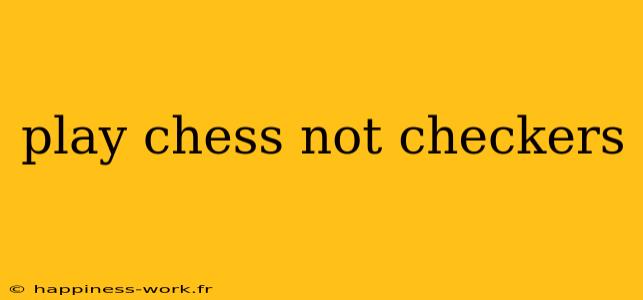The age-old adage "Play chess, not checkers" serves as a reminder to approach challenges in a more thoughtful, strategic manner rather than relying on quick, reactive decisions. But what does this really mean? Let's delve into the lessons we can learn from this phrase and how we can apply them to our everyday lives.
What Does "Play Chess, Not Checkers" Mean?
Chess vs. Checkers: A Comparative Analysis
Chess is a game of strategy where players must think multiple moves ahead. Each piece has unique movements and strengths, requiring foresight and careful planning. In contrast, checkers is a simpler game, often seen as more reactive, where players can easily jump over opponents without much premeditated thought.
Key Differences:
- Complexity: Chess requires extensive knowledge of rules and strategies, while checkers has straightforward rules that anyone can quickly grasp.
- Strategy: In chess, every move can change the entire game, while in checkers, the focus is more on immediate results rather than long-term implications.
What Insights Can We Draw?
By embracing the mindset of a chess player, we learn the importance of planning and strategic thinking. This means analyzing situations, predicting potential outcomes, and considering the long-term effects of our decisions.
How to Apply Chess Thinking in Everyday Life
1. Set Clear Goals
Just as chess players have a clear objective of checkmating their opponent, it’s vital to define what success looks like in your personal and professional life. For example, if you want to increase your career prospects, set measurable goals—like completing a certification or networking with industry professionals.
2. Anticipate Challenges
In chess, anticipating your opponent's moves is crucial. In life, this translates to thinking ahead and preparing for potential obstacles. For instance, if you're launching a new product, conduct market research to understand potential competition and customer preferences.
3. Embrace Long-Term Thinking
Quick wins may be gratifying, but sustained success often stems from strategic planning. Consider investing in your education or savings over time, rather than seeking immediate gratification through impulsive spending.
4. Learn from Every Move
In chess, every game offers an opportunity to learn, regardless of the outcome. Similarly, viewing failures as lessons can provide invaluable insights. For example, if a project doesn’t go as planned, analyze what went wrong to improve future performance.
5. Adapt to Change
Chess players must adapt their strategies based on the flow of the game. In business, market dynamics can change rapidly. Staying flexible and open to new strategies can help navigate unforeseen challenges.
Conclusion: The Strategic Mindset
Embracing the philosophy of "Play chess, not checkers" encourages us to adopt a strategic mindset in our daily lives. By setting clear goals, anticipating challenges, and learning from each experience, we can navigate life's complexities more effectively.
Final Thoughts
Ultimately, the world is more akin to a game of chess than checkers. The ability to think critically, anticipate outcomes, and respond strategically can enhance both our personal and professional lives. So, the next time you face a challenge, remember: strategic thinking is the key to success.
Attribution: This article was inspired by the insights from WikiHow authors on various topics, emphasizing the importance of strategic thinking and long-term planning.
By enhancing the lessons learned and providing practical examples, this article aims to offer additional value and depth to readers interested in adopting a more strategic approach to life.
Keywords: Chess, Strategic Thinking, Life Goals, Business Strategy, Long-Term Planning.
By optimizing the content with relevant keywords and providing actionable insights, this article aims to attract readers seeking to enhance their decision-making skills and life strategies.
